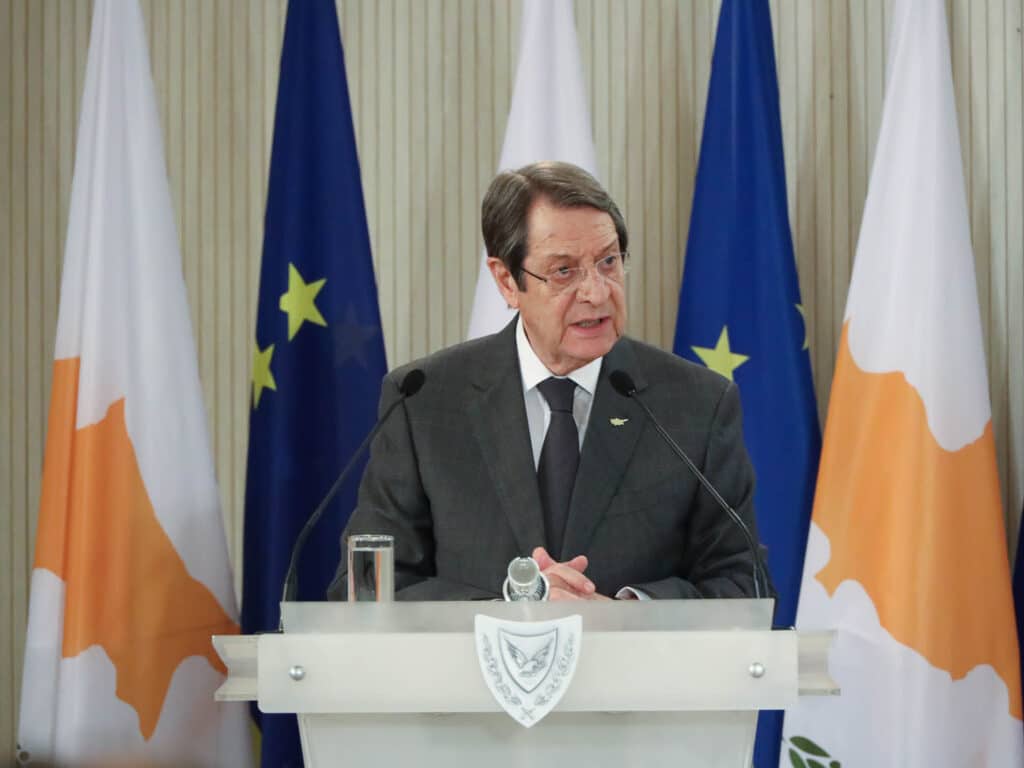Outgoing president Nicos Anastasiades in a final interview on CyBC on Thursday, defended his actions on various hot-button topics of his tenure, including his position on the Cyprob, his role in the 2013 ‘haircut’ and accusations of corruption levied against him and his associates.
Asked the truth about claims by former negotiator and presidential candidate Andreas Mavroyiannis, that during the Crans Montana summit, behind closed doors, he was promoting a two-state solution, the outgoing president said he was saddened by this smear from someone who had worked so hard alongside him for nine years, and asked why, if Mavroyiannis believed this, he had not resigned his post.
His position had been misconstrued, Anastasiades went on to clarify, claiming that what he had sought to develop was a loose federal system with ceremonial presidents and rotating prime ministers, in which core aspects of outward-facing power would be unitary, such as one nationality, one statehood and one government, but with decentralisation and local autonomy, so as to avoid strife and the sense of one ethnicity trying to dominate the other.
At the time he told Turkish Foreign Minister Mevlut Cavusoglu that a two-state proposal would never be accepted internationally, Anastasiades claimed. His vision, the outgoing president said, had been for a true parliamentary democracy and cooperation between Greek and Turkish Cypriots.
Although he personally supported the Annan plan because he believed it would work, after 76 per cent of the public rejected it in the plebiscite, he respected that and set to work to understand why this was the case. A mea culpa on his behalf was not needed, Anastasiades said, as he had not ultimately supported something that would have turned Cyprus into a state resembling Lebanon or Bosnia-Herzegovina.
Another topic the outgoing president was gently prodded about was the suggestion by some that he had failed his country during the crisis of 2012-2013, which lead to the EU imposing closure of the country’s second-largest bank (Cyprus Popular Bank) and the seizure of 48 per cent of uninsured deposits and 47.5 per cent of all bank deposits above €100,000, from the country’s largest commercial bank (Bank of Cyprus).
Defending his actions, Anastasiades said it was an urgent moment, during which he was under huge pressure from the Eurogroup.
“Civil servants had been delayed in getting paid by a month, the country’s investment potential was in the dumps, we could not borrow a cent,” the president said and Eurogroup themselves asked for him to attend the urgent meeting to preempt total collapse and avoid further delays.
In a moment of candour, the president described how intending to walk out at 4 am from a Eurogroup meeting, it became clear to him that he had in fact had no choice, when the ECB representative told him, “You can go, but from Monday your banks will be closed.”
Anastasiades described how he told German Chancellor Angela Merkel in days that followed, that he would have preferred not to have been supported so visibly during his election campaign, only to be called to Brussels to be humiliated.
Addressing the fact that he had promised ‘no haircut’, Anastasiades answered pragmatically, saying “one tries to stay within one’s commitments but it would be cowardice to stick to statements rather than take the beneficial choice.”
Finally, asked about accusations levied against him concerning his law firm’s involvement in the Golden Passports scandal and the chance that the epithet, “most corrupt government ever,” may stick, the outgoing president said he was tired of having to respond to slander.
“We did not do anything which was not legal at the time,” the president maintained, saying that besides this, his family law firm had only processed a small amount of applicants, several of whom were rejected.







Click here to change your cookie preferences